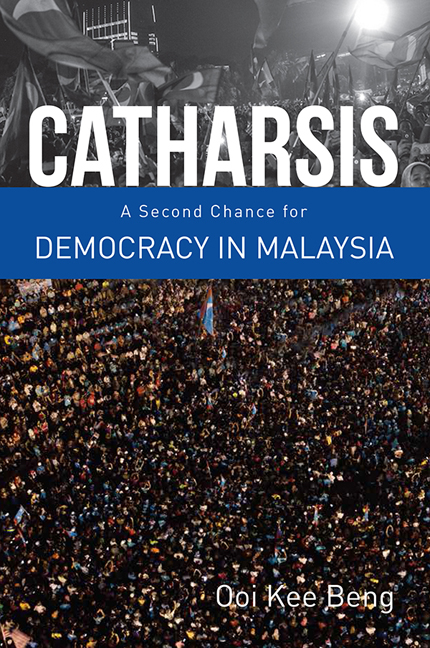Book contents
- Frontmatter
- Contents
- Foreword
- 1 Introduction – Malaysia's Future Is Redeemed
- Before Pakatan Harapan
- Before 9 May 2018
- With Mahathir at the Helm
- 31 One Thing Is Certain—There Will Be More Amendments to the Constitution
- 32 The More Things Change, the More Things May Actually Change
- 33 Did Merdeka Liberate or Create Malaya?
- 34 Interview with Nurul Izzah Anwar: Rebuilding a Nation Long Divided
- 35 The Diminishing of Humans Through Identity Politics
- 36 The Art of Dismantling Cultural Pluralism
- 37 No Need to Let Bigots Dictate Policy
- 38 What the Penang Floods Say About Malaysian Politics (and It's Not Just About Climate Change)
- 39 This is the Moment of Truth for Malaysia's Race-based Politics
- 40 We are Equal Only Through Our Vote
- 41 Why the Opposition Has a Shot at Toppling the Barisan Nasional with Mahathir at the Helm
- 42 Spiralling Back towards Reformasi
- 43 Individual Freedom Is a Matter of National Survival
- 44 Why Meet the Twenty-first Century with Twentieth Century Mindsets?
- 45 A Final Quarrel between a Repentant Grandfather and Oldfashioned Self-absorbed Parents
- 46 Outraged Enough to Go Vote or Cynical Enough to Stay Home?
- Beyond 9 May 2018
- About the Author
36 - The Art of Dismantling Cultural Pluralism
from With Mahathir at the Helm
Published online by Cambridge University Press: 12 February 2019
- Frontmatter
- Contents
- Foreword
- 1 Introduction – Malaysia's Future Is Redeemed
- Before Pakatan Harapan
- Before 9 May 2018
- With Mahathir at the Helm
- 31 One Thing Is Certain—There Will Be More Amendments to the Constitution
- 32 The More Things Change, the More Things May Actually Change
- 33 Did Merdeka Liberate or Create Malaya?
- 34 Interview with Nurul Izzah Anwar: Rebuilding a Nation Long Divided
- 35 The Diminishing of Humans Through Identity Politics
- 36 The Art of Dismantling Cultural Pluralism
- 37 No Need to Let Bigots Dictate Policy
- 38 What the Penang Floods Say About Malaysian Politics (and It's Not Just About Climate Change)
- 39 This is the Moment of Truth for Malaysia's Race-based Politics
- 40 We are Equal Only Through Our Vote
- 41 Why the Opposition Has a Shot at Toppling the Barisan Nasional with Mahathir at the Helm
- 42 Spiralling Back towards Reformasi
- 43 Individual Freedom Is a Matter of National Survival
- 44 Why Meet the Twenty-first Century with Twentieth Century Mindsets?
- 45 A Final Quarrel between a Repentant Grandfather and Oldfashioned Self-absorbed Parents
- 46 Outraged Enough to Go Vote or Cynical Enough to Stay Home?
- Beyond 9 May 2018
- About the Author
Summary
Malaysia is a special place for its natural geography and its human history but most important of all, because of its demographic complexity.
The peninsula is on the western receiving end of the wind systems of the Bay of Bengal, placed between huge and influential civilisations, and endowed as one of the world's few archipelagic regions where the climate is kind, the seas generous and where coastal cultures developed separately from but knowledgeable of each other, isolated populations traded with each other and were quietly cosmopolitan in ways that were, and are, very different from the metropolitan complexity of civilisational centres elsewhere in the world.
New actors from Europe arrived onto the scene and their orientation was much more global in reach and their capacity to transform societies and regions were much greater than those who had come before. They brought to the region what we have learned to call ‘modern times’.
What this intrusion also precipitated, through the new economic structures their arrival implanted, was a hugely accelerated migration of peoples as much from within as from outside the region.
British Malaya
British Malaya, then, whether we acknowledge it today or not, created a radically new demographic situation. The intra-Nusantara population on the peninsula jumped in numbers as much as the extra-Nusantara population did. Most importantly, a new socio-economic pattern came into being, strongly tied to the emergent global economy being midwifed by mercantile Britain.
This global economic, political and ideological connection that accompanied and nourished the demographic changes on the peninsula is what makes Malaysia special.
It is the reason why Malaysia – and more obviously in the case of Singapore after 1963, could so easily move ahead economically after Merdeka in 1957 of its Dutch-controlled and French-controlled neighbours and the semi-colonised Thailand.
British Malaya as a whole, despite the shrewd method of indirect but effective rule used, was therefore a world quite unlike the Malay Peninsula that existed before the late eighteenth century. Let us say that the traditional ‘Pax Nusantara’ was replaced.
The Japanese occupation in 1942–45 was the death knell for the Pax Britannica within which British Malaya could exist and evolve so successfully.
- Type
- Chapter
- Information
- CatharsisA Second Chance for Democracy in Malaysia, pp. 136 - 140Publisher: ISEAS–Yusof Ishak InstitutePrint publication year: 2018

